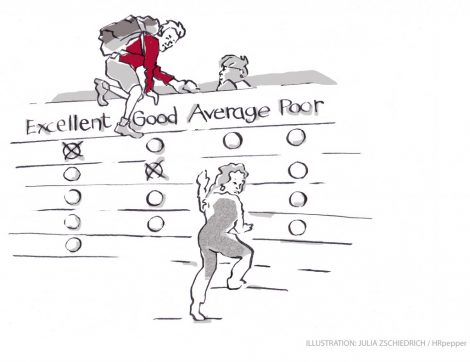The emphasis of meritocracy encourages gender specific (un)fairness

Gender related discrimination of women at the workplace is a common and broadly discussed topic. In Germany less than one third of the leadership is female, the gender pay gap is higher than in most countries and the percentage of the gender gap considering comparable professional biographies, qualifications and jobs is approximately 7 %. Programmes implemented to foster diversity and equality do not show the expected effect. Patterns of discrimination are persistent.
How to interrupt these patterns? In the context of this debate we commonly believe, that when an organisation promotes a culture based on meritocracy and implements merit-based performance management systems, equally performing women with the same job and the same qualifications are equally treated than their male colleagues. We believe this as the idea or meritocracy is based on the principle that everyone has an equal chance to be evaluated and rewarded according to individual merit and contribution, regardless of their gender, race, religion, social status, etc. Gender related disparities, mostly caused by gender bias and negative stereotypes shall be prevented.
Research conducted by Emilio J. Castilla (MIT) and Stephen Bernard (Indiana University) reveals the opposite: When an organisation emphasis its core values and performance evaluation systems as meritocratic, manager show greater bias in favour of men over equally performing women when translating performance into decisions related to rewards and career development. This results in distortions to the disadvantage of women.
The outcome of the study is based on three experiments with a total of 445 participants with managerial experience. They were asked to evaluate several employee profiles and make recommendations for hiring, bonus, promotion and termination considering the specific organisational culture. The gender of the employee was manipulated and some of the organisations were explicitly described as meritocratic.
The results are striking: When an organisation was presented as meritocratic and when the principle of merit based pay was emphasised, monetary rewards for men were higher than those for women in the same job, with the same manager and the same evaluation results. The preference towards men in hiring and career decision over equally performing women was also higher, although the gap between men and women was not that big. Castilla and Bernard call this phenomenon „the paradox of meritocracy effect in managerial decisions“.
The emphasis on meritocracy as an organisational value and merit-based performance evaluations provoke gender related discrimination.
How can the paradox be explained? Is the meritocratic system itself to blame for the discrimination of equally performing women demonstrated in lower bonus and promotion rates or is it just too difficult to establish leadership behaviour, which is gender equitable? Castilla and Bernard identified a direct causal relationship of the increased discrimination and the meritocratic values: meritocratic systems can intensify gender bias and stereotyping of women at work.
One frame condition for this paradox is the phenomenon of „moral credentials“ analysed by Benoit Monin. It explains why individuals are more prone to express prejudiced attitudes when they consider their moral credentials as being non-prejudiced. For our findings it means, that managers evaluating employees on behalf of the meritocratic organisation are more likely to discriminate against women and jeopardise the values. They feel themselves unbiased and do not reflect their individual prejudices.
Another mechanism, which can explain the paradox, has been analysed by Uhlmann und Cohen. There study “I think it, therefore it’s true” shows that when people feel objective, they rely more on their individual believes and act on them when taking employment decisions. Emphasising meritocratic values intensifies the feeling of individual objectivity. In the case of a manager with negative stereotypes about women it can provoke discrimination while being convinced of being objective and fair. In other words, the more a person believes in the organisational system the higher the risk to not reflect anymore on individual beliefs and question existing prejudices.
What do we learn from this finding? How can we interrupt these patterns of gender specific discrimination? Programmes for the promotion of diversity and professional equality for men and women do not show the expected results. Negative stereotypes toward women in the workplace need to be unmasked. It is essential that organisational values based on meritocracy are articulated and implemented the way that every employee, especially those in managerial positions, have the responsibility to act upon them. Overall goal is to create transparency on acts of discrimination, to analyse the consequences and to identify ways to interrupt these patterns. Prejudices, bias and distortions will remain if they are not consequently, intentionally and repetitively broken.
Sources

